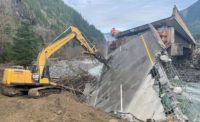Young Iraq War Vet 'Walks the Walk' as CEO on a Mission

Moving from active combat to a civilian career can be a tough transition for returning veterans, especially those who have been injured in service. But Hien Manh Tran, known as HT, has made the switch from recovering in an Army hospital to running construction jobsites as founder and CEO of the fast-growing, San Francisco-based contractor Anvil Builders Inc. Now, he aims to convince industry peers to share his view that veterans make great employees and bosses.

|
| TRAN |
There, Tran met an unusual hospital volunteer who set him on the path to his future career: Bob Nilsson, a former U.S. Marine Corps captain and retired president of Turner International Co. He introduced Tran and other recovering vets to a program he started to teach and inspire them to create their own businesses when they recovered. "HT was impressive from the first day I met him," says Nilsson. "He is exceedingly bright, and I sensed ... that he wanted to be his own boss and run his own company."
On-the-Job Training
Tran earned a degree in marketing before joining the Army, but his Iraq deployment provided on-the-job training in construction management, as his platoon worked to turn abandoned buildings and outposts into habitable spaces. "We were sent out in the middle of nowhere, so we had to be a jack of all trades," he says. "This is how I fell in love with construction."
After leaving Walter Reed, Tran joined Northrup Grumman as a procurement officer but already was setting in motion plans for his own business. "He diligently went through the steps of incorporation, registration, creating partnerships, developing a business strategy, analyzing the marketplace and recruiting key staff," says Nilsson. Anvil Builders was founded in 2010. Additional industry expertise came from company partner and COO Alan Guy, a former Webcor Builders project manager, plus an advisory board of construction, real estate and management experts.
The firm now employs about seven service-disabled veterans and plans to increase that number as it grows. Since its founding, Tran says Anvil Builders has executed more than 100 construction contracts, with a 2015 revenue goal of about $25 million. He says his company does about 80% public-sector work and 20% for private clients. The firm recently was awarded its largest project: foundation work on a residential development, near Candlestick Park stadium, in San Francisco. "The construction industry mirrors the military model," says Tran. "There is a chain of command, the work is very task-oriented, the communication is very direct, and it's a teamwork environment."
Tran says being seen as a "legitimate" firm was one of the biggest business challenges he faced. He participates in work under California's Disabled Veteran Business Enterprise program, which lets state agencies set a goal of earmarking 3% of all contracts to companies owned by disabled veterans. "By doing due diligence and by self-performing all our own work, that gave us a lot of credibility," says Tran. Guy credits Tran's leadership by example. "HT expects 110% out of everyone—employees, peers and clients," he says.
Tran also has extended his veteran hiring mission through activism in United Contractors, a regional group of more than 450 union employers. "We've placed every veteran who has come through here," says Emily Cohen, the group's director of government relations. "HT is a big part of why we're doing this. He's a guy of vision in a business where character matters."
Earlier this year, the White House and the industry initiated a program to have construction firms hire 100,000 veterans over the next five years. Nilsson says he is "encouraged that the government is taking these steps with private-sector support."







